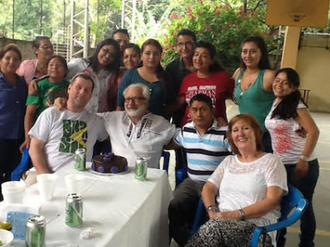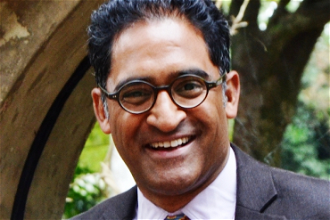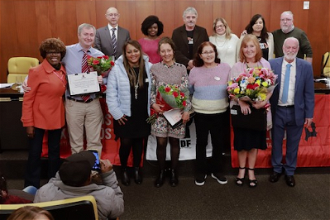Michael Campbell-Johnston SJ, RIP

CJ's last visit to San Salvador, November 2011, with Michael Kirwan SJ, Fr Emilio Melara, PP of San Antonio Abad where he served as parish priest.Clare Dixon is at the front right
Clare Dixon, co-chair of the Archbishop Romero Trust, former Head of Region - Latin America at CAFOD, writes:
Fr Michael Campbell-Johnson, known to many as simply 'C-J', died on the evening of Thursday 12th October at the Jesuit retirement home in Boscombe, Bournemouth, at the age of 92.
Born in London into a comfortable upper-class family, as a young boy his earliest ambition was to be a priest, a commitment which never wavered. His brother Christopher recalled an early event in their childhood when his older sibling Michael decided to conduct the funeral service of the family's pet dog, where he officiated with due pomp and ritual. After an education at Jesuit prep school and Beaumont college he began his studies for the priesthood with the Society of Jesus in 1949, just before his eighteenth birthday.
Michael's Jesuit studies took him from the LSE to Paris and then to Mexico for theology studies where he was a contemporary of the Jesuit, Fernando Cardenal who went on to become Minister of Education in Nicaragua. From there he went on to further studies in Brazil and travelled widely across Latin America where he became involved in pastoral work and learned about the Jesuits' social justice outreach throughout the region. On completing his studies his first appointment took him to Guyana, part of the British Jesuit Province, where he became a Guyanese citizen and set up the Jesuit Social Institute there before being called to work for the Jesuits in Rome.
I first met Michael in the late 1970s, when he was already something of a legend. He was the highest-ranking English-born Jesuit - or as he would always insist of Scots heritage - based at that time in Rome at the Jesuit world HQ. Appointed in 1975 as Director of the Social Secretariat in the General Curia, he was at the right-hand of the great Jesuit Superior General, Pedro Arrupe, the man who inspired and led the Jesuits onto a new course: setting the promotion of social justice as the key priority of their work: an early commitment to the preferential option for the poor. During the years in Rome C-J was Fr Arrupe's envoy to support and encourage the development of Jesuit social justice institutes in Latin America, which included various encounters with the then Argentine Jesuit Provincial, Jorge Mario Bergoglio, during the challenging years of the military regime in that country.
In 1980, at the height of the tragic exodus of the "boat people" of Vietnam, Fr Arrupe charged Michael with taking forward a new Jesuit venture, setting up and leading the Jesuit Refugee Service as an adjunct to the Social Secretariat. The JRS became a key player in fighting for the rights and protection of refugees and the displaced and continues its life-saving mission in many situations of conflict across the world today. In 1984, with his duties in Rome accomplished, Michael was appointed to El Salvador to set up the JRS in Central America where countless thousands of refugees were fleeing from war and military repression across the region.
I recall being in awe of Michael from the very start: he struck an impressive figure, well over six feet tall: in his clerical suit he appeared the very essence of the well-born gentleman that he was. But that first impression was deceptive as Michael was rarely seen in his clericals, but rather sporting a sometimes torn and always worn-out shirt, baggy trousers and open-toed sandals. Never was he happier than when accompanying the poorest and most deprived communities, tending to their physical needs, providing protection and safety, as well as the spiritual dimension so fundamental to the lives of people in a country named after Christ the Saviour. Michael set up the JRS HQ in a parish centre which had been abandoned since January 1979 after the army had murdered the parish priest, Octavio Ortiz, and four young catechists. Michael and his JRS team transformed a place of fear into one of sanctuary. He spent much of the 1980s running the JRS in El Salvador and encouraging outposts of the service in Colombia, Haiti and across Latin America.
He was aghast when, after just four years, the call came for him to become Provincial of the British Jesuits. He was never a bureaucrat and his transition to the Jesuit HQ on Farm Street, in the heart of Mayfair, felt to him like a cruel exile from his preferred setting, living among and ministering to the dispossessed, where he felt he could make a difference. Nevertheless, he used his time productively, dealing with the complex management and processes of change within the Jesuit Province, keeping up with family and friends and participating, somewhat controversially, at a Conservative Party conference debate on the theme of "Can a Christian be a Conservative". He also joined the Board of CAFOD which had been a constant supporter of his JRS work since its creation.
It was during his time as Provincial that six of his Jesuit brothers were murdered along with two women employees at the UCA - the Jesuit Central American University - on 16th November 1989. That night, in the midst of grief, Michael led a prayer vigil outside the El Salvador Embassy, just a short walk away from the Jesuit Provincial HQ in Mayfair. Fr Arrupe's vision for the Jesuits was never more relevant: "What does it mean to be a Jesuit today? To engage under the banner of the Cross in the crucial struggle of our time: the struggle for faith and the struggle for justice that faith itself demands. .... We will not work for the promotion of justice without paying the price".
It was with some relief, not only to Michael but perhaps also to some members of the British Province, when his 6-year term of office came to a close and he returned to El Salvador in 1993. After a decade of civil war the country needed to rebuild and Michael set to work transforming JRS into a new Jesuit Development Service adapting it to the need to reunify communities displaced by the conflict. He was a model of multi-tasking, teaching at the UCA, and taking over as pastor in the gang-plagued parish of San Antionio Abad. For a decade his parish house was my home on multiple visits to San Salvador.
Michael's parish house was an ancient, ramshackle, rat and feral pigeon-infested former farmhouse on an unpaved lane in an insalubrious part of town. His street address, as a happy coincidence, was Calle La Granjita, Little Farm Street, as far a cry away from its Mayfair namesake as can be imagined. Michael, alongside his appropriately named parish council, with vice-chair Rafael and secretary Gabriel, sought to build a community of solidarity within a country where the legacy of civil war, military repression and gang violence held sway. The parish centre was always alive with the laughter of children, alongside a parish clinic, training workshops and a playground used equally as a means of rehabilitating members of the local gang, the Mau Mau, and recreation for the children of the local primary school.
Michael reluctantly left El Salvador in the noughties when the British Province posted him to Barbados, to run the retirement home for the elderly Jesuits of Guyana and the Caribbean. His parish church of St Francis of Assisi, on the beach, was set among the five-star hotels and private mansions of the mega-rich. On occasion he had to craft his sermons very carefully for a mixed congregation which sometimes included Tony Blair and family. His time in Barbados completed Michael returned to London for several years and, in failing health, to the Jesuit care home in Boscombe.
Michael was a great admirer of Archbishop Romero and a close friend of the UCA Jesuit community who were murdered by the Salvadorean military in 1989 and his love of El Salvador and its people was passionate and enduring. He was a towering figure amongst his fellow-Jesuits in Latin America and further afield. I admired him enormously and am glad that he lived to see how his brother Jesuit, Pope Francis, placed social justice and the plight of refugees and migrants at the heart of his papacy.


















